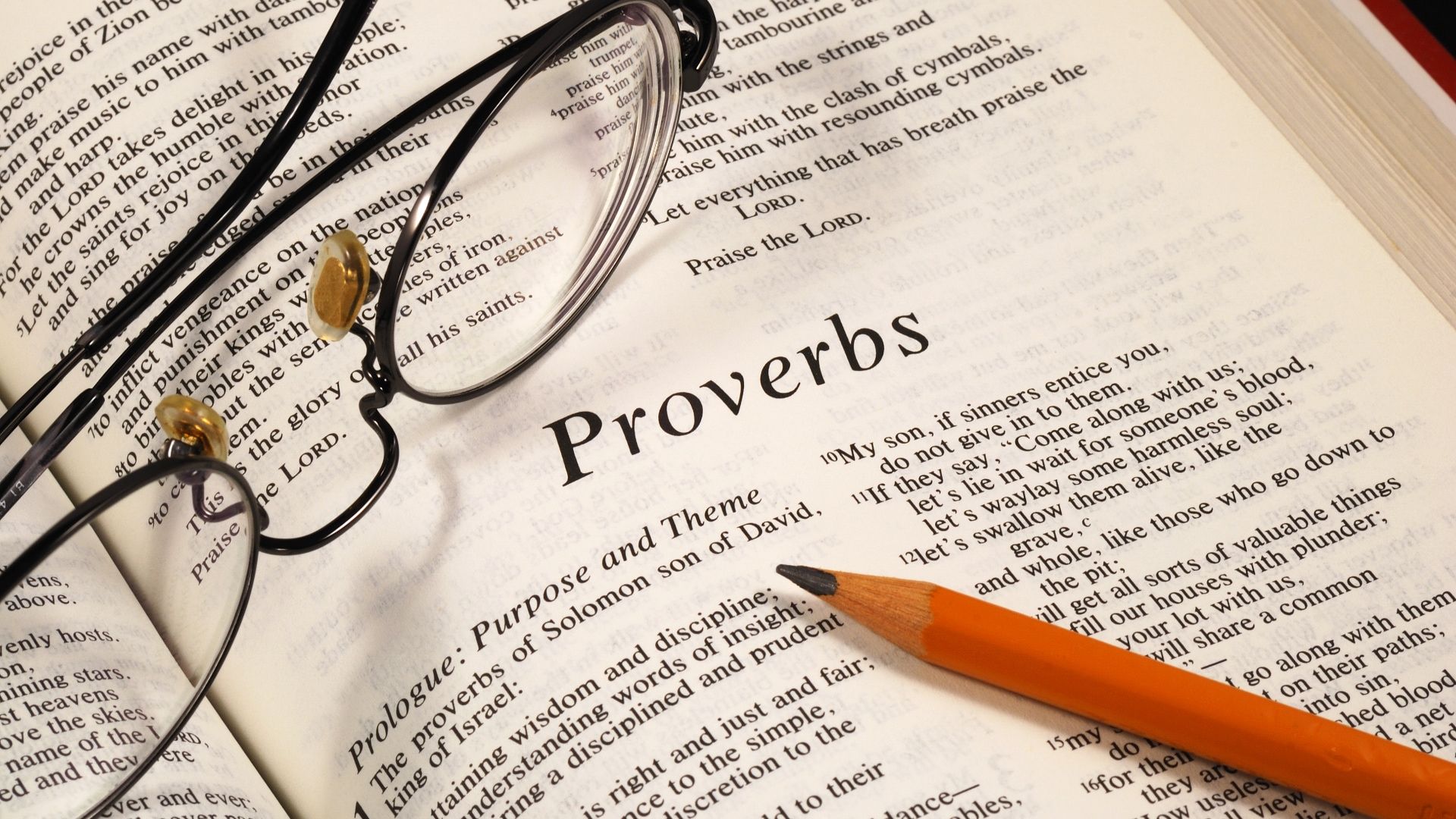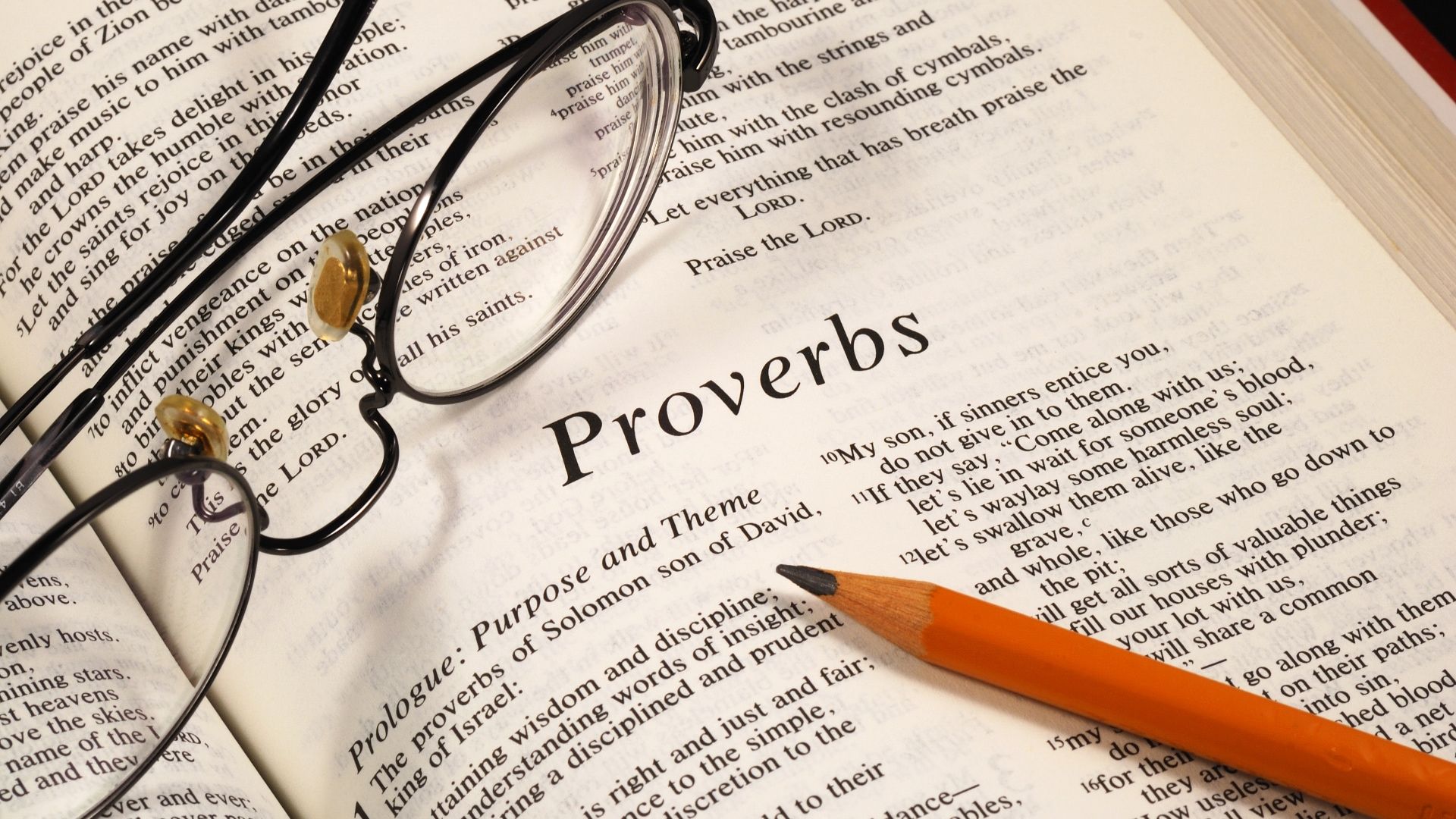Wisdom and Money (Proverbs)

I really don't know what I was thinking when I planned this series. Last week we talked about sex, and this week we're talking about money. I seem to be heading into all kinds of trouble. You don't get much more personal than talking about sex and money, but both are recurring themes in the book of Proverbs. That's why we're talking about them. We can't live wisely unless we learn to live wisely when it comes to our sexuality, and also with our money.
We had mice in our house a few years ago. I set out all kinds of traps. One day I went to a trap and discovered a mouse there. I took the trap over the garbage and released the trap, expecting the dead mouse to drop into the garbage pail. Instead it ran away. That dumb mouse was smart enough to play dead until it could escape. That mouse may have been smart enough to escape the first time, but I'm pretty sure I captured it again, and that time it didn't get away.
Here's what we need to know: There are some traps that we tend to fall into. These traps have been around for thousands of years. The writer of the book of Proverbs has identified some of these areas, and offers advice to us on what we need to do to avoid setting off the traps and therefore ruining our lives.
One of the areas in which there are a lot of traps is the area of money. So today I want to look at what the book of Proverbs says about money. There's no way that we can look at everything the book of Proverbs says about money. I would encourage you to do what I end up doing with each of the topics we're looking at: to read through the entire book and to select the proverbs that have to do with a particular topic.
Even though we can't cover everything that Proverbs says about money, I think we can come up with a fairly useful summary of its message. When it comes to money, according to Proverbs, there are four things we need to know. Here's the first one:
1. Money is good
This may fall into the blindingly obvious category, but it's important to state. The reason is that some people have a mistaken view of money. They think that money is evil, that it's a bad thing. There are many people who think that the Bible says that money is the root of all evil, when in fact it doesn't say that at all. It says the love of money is the root of evil. Others glorify poverty. I remember sitting in a cemetery of all places eating lunch years ago with a person who said, "My life is just fine in every area except for one. I just wish there was no such thing as money." He had a very negative view of money. Some people think that it's wrong to save and to take prudent financial measures, like they pit spirituality against financial wisdom.
But Proverbs doesn't endorse this view, nor does it say that it's wrong to make lots of money.
For instance, Proverbs 6 tells us that we need to learn from ants and work hard, storing provisions in summer and gathering food at harvest. It says that poverty and scarcity come to those who are lazy.
Proverbs 8 tells us that God often blesses those who are wise with wealth:
With me are riches and honor,
enduring wealth and prosperity.
(Proverbs 8:18)
It says we should gather money by working hard and saving:
Dishonest money dwindles away,
but whoever gathers money little by little makes it grow.
(Proverbs 13:11)
And just one more example. Proverbs 22:4 says:
Humility is the fear of the LORD;
its wages are riches and honor and life.
I won't belabor this point, but it's an important one. There are some people who glorify poverty and look at anyone with money as being suspect. They think that there must be wrong with someone who has a nice house or who earns lots of money. They create this artificial dichotomy that says that spirituality is good and that money is bad. But there is nothing inherently wrong with money, nor is there anything inherently good about poverty. Money is actually a blessing from God. If you think that money itself is bad, you need to correct that thought, because you certainly don't get that idea from the Bible, or at least from Proverbs.
But here's the second thing that Proverbs tells us:
2. Money brings dangers
Don't make a mistake here. It's not that money is bad, but money does present some dangers. In other words, there are traps. This is probably the biggest theme to do with money in the book of Proverbs, so let's just look at a few of the dangers or traps we face when it comes to money.
One danger we face is the temptation to make money through unethical means. Proverbs 11:1 says:
The LORD detests dishonest scales,
but accurate weights find favor with him.
This proverb is repeated, which indicates its importance. It's basically an argument for honest business practices. When the weight of an item that's being sold is calculated dishonestly, it's detestable to the Lord. The Hebrew actually calls it an abomination, which is very strong language. It's the type of word that's usually used for sexual sin like cheating on your spouse. When you sell your house but you're not completely honest with the buyer about the condition of the house, or when you are in business and withhold information in order to make a sale, then those are corrupt business practices, and that is an abomination to the Lord.
Another danger is a little more subtle than that. Later on in the same chapter we read:
People curse those who hoard grain,
but they pray God's blessing on those who are willing to sell.
(Proverbs 11:26)
As I say, this is a bit more subtle. The picture is of someone making a business decision. If a commodity is scarce, then that scarcity can cause prices to go up, which could lead to a greater profit. A business person may be tempted to hold on to that commodity in order to make a greater profit, but then the community suffers because they need that commodity. Proverbs says that we can't focus only on the bottom line. The decisions that we make in business and as we make money are twofold: first, what makes good business sense? and two: what will benefit the community? If we don't ask how our financial decisions will help the community at large, and not just make money for me, then we're not handling our money wisely. We're falling into a trap.
Probably the biggest danger when it comes to money, though, is the one that's mentioned in verses like these:
Those who trust in their riches will fall,
but the righteous will thrive like a green leaf.
(Proverbs 11:28)
The wealth of the rich is their fortified city;
they imagine it a wall too high to scale.
(Proverbs 18:11)
Give me neither poverty nor riches,
but give me only my daily bread.
Otherwise, I may have too much and disown you
and say, 'Who is the LORD?'
(Proverbs 30:8-9)
You know the problem with money? It's not actually a problem with money; it's more of a problem with us. When we have money, we tend to put our trust in it rather than in God. Those who are rich often end up being the most spiritually impoverished, because money can become an idol in life. It's what they depend on rather than on God.
C.S. Lewis said:
One of the dangers of having a lot of money is that you may be quite satisfied with the kinds of happiness money can give and so fail to realize your need for God. If everything seems to come simply by signing cheques, you may forget that are at every moment totally dependent on God.
Jesus himself said, "How hard it is for the rich to enter the kingdom of God! Indeed, it is easier for a camel to go through the eye of a needle than for the rich to enter the kingdom of God" (Luke 18:24-25). I've heard all kind of people say that the eye of a needle was a gate in Jerusalem, so Jesus is saying that a camel will have a hard time getting through this gate, but it's not impossible. The problem is that the gate in Jerusalem known as "The Needle's Eye" was built during the Middle Ages and was not in existence in Jesus' day. Jesus is actually saying that it's as likely that a rich person to enter the kingdom as it is for you to be able to thread a needle with a camel. It's impossible, unless God intervenes.
So there's a danger, and we need to recognize that this is a danger for every person here. I know that very few of us feel rich here this morning. For us, rich is about $50,000 more a year than what we're making. But if earn the average full-time income in the city of Toronto – the average, not the highest – then you are in the top 4% of richest people in the world. You don't feel rich, but indeed we are. We need to understand that money isn't bad, but that it has dangers. Jesus talked about these dangers, and warned us that the main alternative to following him is not following atheism or some other religion. It's following money.
So one: money isn't bad. Two: money brings danger. Three is almost the same:
3. Money has limits
Even if we avoid all the dangers that come with money, even if we are completely wise in how we handle money, we need to recognize that although money is good, money has its limits. Even if you avoid all the dangers of money, and instead earn it ethically, use it for the common good, and trust God – even then, money can only do so much.
There are a lot of verses that touch on this, but probably the best one for us to consider this morning is found in Proverbs 11:4:
Wealth is worthless in the day of wrath,
but righteousness delivers from death.
What's he talking about here? The writer has nothing against wealth. But there comes a day when money won't do a bit of good. "The day of wrath" could refer to a tragedy that hits us, or it could refer to the day of judgment when we stand before God. In either case, you can have all the money in the world, and it won't do you any good.
In fact, even in this life, money can bring you headaches that others don't have. Proverbs 13:8 says:
The rich may be able to ransom their lives,
but the poor cannot respond to threatening rebukes.
In other words, the problem with having money is that you can be robbed and extorted. You can lose your money in the stock market. You can make a bad investment and lose everything. But the poor don't have that problem. They've got less to lose, which means that they've got less to worry about in the end.
Let's review where we've come so far. Money is good. If you have money, you're blessed. But money comes with dangers and limits. You may be asking why money is so good if it comes with so many dangers and limits? It's because you haven't seen what Proverbs says about the best thing you can do with your money.
4. Proverbs gives us the key to wise use of our money: generosity
Proverbs 11:24-25 says:
One person gives freely, yet gains even more;
another withholds unduly, but comes to poverty.
A generous person will prosper;
whoever refreshes others will be refreshed.
This is a theme all throughout the book of Proverbs. Verse 24 literally says, "There is one who scatters, and yet increases all the more."
This is completely counter-intuitive. Common sense would lead us to believe that holding on to our possessions is a more certain way to wealth. It's a paradox. Here we're told that the best way to wisely handle our money, and to get even more, is to scatter it – a word that carries the meaning of throwing it "wildly, loosely, and freely about." It doesn't carry the idea of care and caution. In other words, the best way to handle your money is to be wildly and radically generous with it. Don't save it and accumulate it for your own purposes. Don't waste your life by playing it safe and living the middle class dream. Use what God has given you and be wildly generous with it.
The only way this makes sense is if you think agriculturally. The farmer who clings so tightly to the seed because he wants to keep it ends up with a bunch of useless seed. But the farmer who sows his seed in the field ends up with not only more seed, but a harvest as well.
This isn't just a theme in this passage. You can find it all throughout the book of Proverbs. It occurs over and over. For instance:
Those who are kind to the poor lend to the LORD,
and he will reward them for what they have done.
(Proverbs 19:17)
The generous will themselves be blessed,
for they share their food with the poor.
(Proverbs 22:9)
This is also a theme in the New Testament. Jesus himself said, "Give, and it will be given to you. A good measure, pressed down, shaken together and running over, will be poured into your lap. For with the measure you use, it will be measured to you" (Luke 6:38). Paul wrote to Timothy and said:
Command those who are rich in this present world not to be arrogant nor to put their hope in wealth, which is so uncertain, but to put their hope in God, who richly provides us with everything for our enjoyment. Command them to do good, to be rich in good deeds, and to be generous and willing to share. In this way they will lay up treasure for themselves as a firm foundation for the coming age, so that they may take hold of the life that is truly life. (1 Timothy 6:17-19)
The reason we're talking about this today isn't because the church needs money. The reason is that although money is good in itself, it comes with dangers and limits. And the main Biblical way to neutralize money's dangers and limits and, ultimately, to save our souls, is to give it away. Ironically, the more we give it away, the more God will entrust to us.
You say, "How much do I give away?" C.S. Lewis said, "I am afraid the only safe rule is to give more than we can spare." If your generosity is not affecting your lifestyle, your vacations, your purchasing habits, you are not giving enough.
We're going to take an offering in a minute. The primary reason that we give isn't because the church needs money. The primary reason we give is that although money is good, it comes with dangers and limits, and the only way to neutralize these dangers and limits is to be wildly generous and as much as we possibly can.
And our model for this, by the way, is the ultimate one who scattered: Jesus Christ. He didn't just give a little. He gave everything. He was literally scattered and broken for us. And because of that we are part of a harvest that will continue through eternity. "For you know the grace of our Lord Jesus Christ, that though he was rich, yet for your sake he became poor, so that you through his poverty might become rich" (2 Corinthians 8:9)
Father, thank you for money. For whatever reason you have placed us in a prosperous country. Although many of us think we don't have much, the reality is, Father, that you have blessed us.
I pray that you would awaken us to the dangers and limits of money. Preserve us from the dangers of a middle-class, self-absorbed lifestyle. Teach us how to follow the example of Jesus Christ. Save us from the deceitfulness of riches. For those who are generous and willing to share lay up treasure for themselves as a firm foundation for the coming age, so that they may take hold of the life that is truly life. In Jesus' name we pray, Amen.





